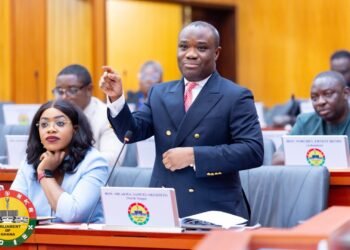The University Teachers Association of Ghana (UTAG) has announced to suspend of its nationwide strike, which began on October 10, 2024.
This decision, made after deliberations by the National Executive Council (NEC), was disclosed in a press release issued by the UTAG National Secretariat. Signed by the association’s National President, Prof. Mamudu A. Akudugu, the statement expressed deep gratitude to its members for their commitment and underscored the significant progress made during the industrial action.
“NEC after thorough deliberations, has directed to suspend the strike action effective Tuesday, 29th October 2024, and is seeking members’ affirmation or otherwise of this directive.”
Prof. Mamudu A. Akudugu, UTAG National President
According to the press release, UTAG has tasked its National Independent Elections Committee (NIEC) to facilitate a vote by the close of Monday, October 28, 2024. The outcome of this vote will determine whether the suspension takes immediate effect or if the strike will continue.
UTAG’s press release highlighted its primary demand: the immediate ban on mining and prospecting for gold and other minerals in forest reserves, farmlands, and water bodies. Illegal mining activities, particularly galamsey, have caused severe damage to water bodies, agricultural lands, and forest reserves across Ghana, threatening the livelihoods of millions of citizens.
UTAG emphasized, “As scholars and educators, we believe it is our civic responsibility to ensure that future generations of Ghana inherit a sustainable and healthy environment.”
During the 19-day strike, UTAG members demonstrated a strong sense of purpose, using various platforms to raise awareness about illegal mining and its far-reaching consequences.
The association organized a series of nationwide protests, lectures, and discussions that emphasized the need for government intervention. Leveraging media platforms, including social media campaigns under the hashtag #BanMiningNow, UTAG rallied the public and engaged stakeholders in a concerted effort to address the crisis.
Broader National Advocacy

In addition to pressuring the government, UTAG took a proactive approach by developing a “Pact for Candidates” in the lead-up to the 2024 presidential election. This initiative aims to secure commitments from presidential candidates to prioritize the fight against illegal mining as a national policy issue.
UTAG believes that placing environmental sustainability at the forefront of political campaigns will ensure that future governments take bold action against illegal mining activities.
“Our strike action has demonstrated significantly throughout the country our commitment to protecting and sustaining the environment for present and future generations.
“We have won the admiration and confidence of the Ghanaian people in us to always stand up for the welfare of our country.”
Prof. Mamudu A. Akudugu, UTAG National President
One of UTAG’s key demands was the revocation of the Environmental Protection (Mining in Forest Reserves) Regulation 2022 (L.I. 2462).
This legislative instrument, passed in 2022, allowed mining in forest reserves under certain conditions, a move that environmentalists and civil society organizations have fiercely criticized.
UTAG argued that such regulations exacerbate the ongoing environmental degradation caused by galamsey, urging the government to revoke it and expand its anti-illegal mining task force to include forest reserves.
In the press release, Prof. Akudugu extended gratitude to all UTAG members for their unwavering support during the strike. He also acknowledged the efforts of stakeholders who committed to working with the association to address the pressing environmental challenges facing Ghana.
“Let us all remain vigilant and united in the pursuit of a sustainable future for Ghana,” the statement concluded, highlighting UTAG’s ongoing commitment to environmental advocacy.
UTAG’s nationwide strike has drawn significant attention to the environmental crisis facing the country, particularly in the areas of illegal mining and its devastating effects on water bodies, forests, and agricultural lands.
The strike also highlighted the power of non-political advocacy and the critical role that academics and educators can play in shaping national policy debates.
READ ALSO: GSE Composite Index Holds Steady Despite Weekly Losses























